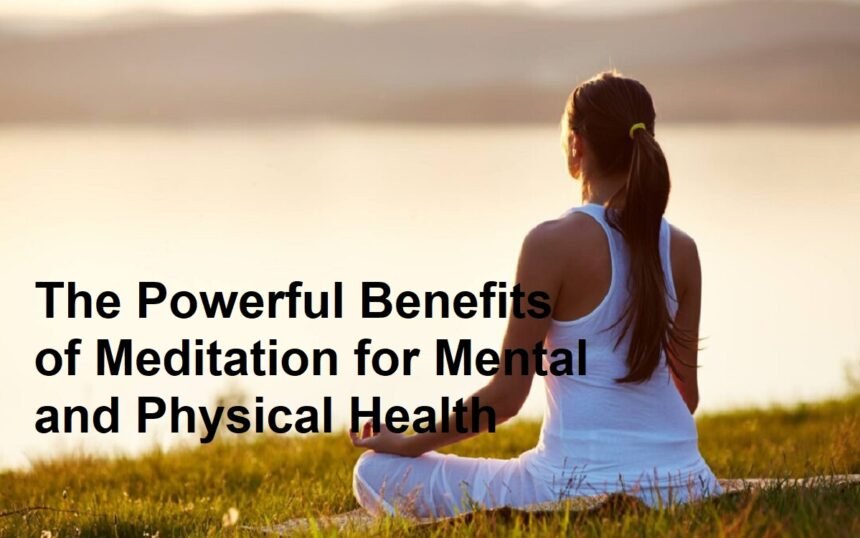Introduction
In today’s fast-paced world, stress and anxiety often feel like part of daily life. Many people search for a simple yet effective way to bring more balance and peace into their routines. One practice that has stood the test of time is meditation.
Meditation is more than just sitting quietly. It’s a way to connect with yourself, calm your thoughts, and bring your body into a state of relaxation and healing. The benefits of meditation go beyond reducing stress — it also helps with mental health, physical health, and overall happiness.
In this guide, we’ll explore the key benefits of meditation, why it matters, and practical tips to start your own practice.
What is Meditation?
Meditation is a practice of focusing the mind and bringing awareness to the present moment. It often involves deep breathing, stillness, and sometimes guided visualization.
While there are many types of meditation, the goal is generally the same: to achieve clarity, inner peace, and relaxation.
Some common meditation styles include:
- Mindfulness meditation – observing thoughts without judgment
- Guided meditation – using a teacher or audio to guide the practice
- Breathing meditation – focusing on your inhale and exhale
- Loving-kindness meditation – focusing on compassion and gratitude
The Mental Benefits of Meditation
1. Stress Reduction and Relaxation of the Mind
One of the most well-known benefits of meditation is stress relief. When you meditate, your body lowers cortisol levels (the stress hormone). This helps your mind and body enter a state of calm.
Practical tip: Try a 10-minute breathing meditation after work to relax your thoughts and release daily tension.
2. Better Focus and Concentration
Meditation trains your brain to stay present. Regular practice sharpens your focus, improves productivity, and helps you avoid distractions.
Practical tip: Before starting your day, spend 5 minutes in mindfulness meditation to set a calm and focused tone.
3. Improved Mental Health and Emotional Balance
Meditation has been shown to reduce symptoms of anxiety and depression. It creates space between you and your thoughts, allowing you to respond calmly instead of reacting emotionally.
Practical tip: If you feel overwhelmed, pause for a short meditation to reset your mind.
4. Boosting Self-Awareness and Mindfulness
Meditation encourages mindfulness, which means living in the present moment. It helps you become more aware of your thoughts, emotions, and actions, leading to better decision-making and emotional control.
Practical tip: Practice mindfulness meditation during meals — eat slowly, notice textures and flavors, and enjoy the moment.
The Physical Benefits of Meditation
1. Better Sleep Quality
Many people struggle with insomnia or restless nights. Meditation helps relax the nervous system and calm racing thoughts, making it easier to fall asleep and stay asleep.
Practical tip: Try a guided body scan meditation before bed to promote deeper rest.
2. Lower Blood Pressure and Heart Health
Studies show meditation lowers blood pressure and supports a healthier heart by improving blood circulation and reducing stress.
Practical tip: Just 15 minutes of meditation a day can contribute to long-term heart health.
3. Stronger Immune System
Meditation supports the immune system by reducing stress and inflammation in the body. A calm mind allows your body to repair itself more effectively.
Practical tip: Pair daily meditation with healthy habits like proper sleep and balanced nutrition for maximum benefits.
4. Pain Management
For people with chronic pain, meditation helps manage discomfort by shifting focus away from pain and teaching the brain to handle it differently.
Practical tip: Explore mindfulness-based stress reduction (MBSR) programs, which combine meditation and gentle awareness for pain relief.
How to Start Meditating (Even as a Beginner)
Step 1: Find a Quiet Space
Choose a calm, comfortable place where you won’t be disturbed.
Step 2: Sit Comfortably
You don’t need a fancy cushion. Just sit in a position where your back is straight and your body feels relaxed.
Step 3: Focus on Your Breath
Close your eyes and notice your inhale and exhale. If your mind wanders (and it will), gently bring your focus back to the breath.
Step 4: Start Small
Begin with 5 minutes a day and gradually increase as you feel more comfortable.
Step 5: Stay Consistent
Like any habit, the real benefits of meditation come from regular practice.
Practical Tips to Make Meditation a Habit
- Set a reminder: Meditate at the same time daily, such as right after waking up.
- Use an app or guide: Apps like Headspace or Calm can help beginners.
- Stay patient: Don’t expect instant results — progress takes time.
- Mix it in daily life: You can practice mindfulness while walking, eating, or even washing dishes.
Common Myths About Meditation
- “I need to clear my mind completely.”
Not true — meditation is about observing your thoughts, not stopping them. - “I don’t have time.”
Even 5 minutes a day is enough to see benefits. - “It’s only for spiritual people.”
Meditation is a practical wellness tool, backed by science, for anyone.
Long-Term Benefits of Meditation
By practicing consistently, you’ll notice:
- Reduced anxiety and better mood
- A calmer, clearer mind
- More patience and self-control
- Improved sleep and physical health
- Greater sense of happiness and fulfillment
Conclusion
The benefits of meditation are powerful, simple, and accessible to everyone. From reducing stress and promoting relaxation of the mind to improving mental health and boosting physical well-being, meditation is a natural way to take care of your body and soul.
The best part? You don’t need hours or special equipment. Just a few minutes each day can make a big difference.
Ready to experience the power of meditation for yourself? Start small — just 5 minutes a day — and notice how it changes your energy, mood, and clarity.












